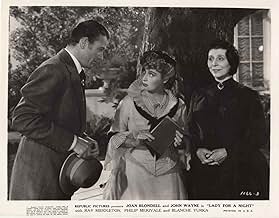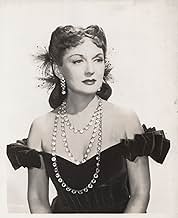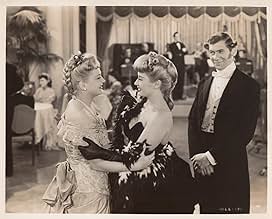अपनी भाषा में प्लॉट जोड़ेंGambling boat operator Jenny Blake throws over her gambler beau Jack Morgan in order to marry into high society.Gambling boat operator Jenny Blake throws over her gambler beau Jack Morgan in order to marry into high society.Gambling boat operator Jenny Blake throws over her gambler beau Jack Morgan in order to marry into high society.
- निर्देशक
- लेखक
- स्टार
Hall Johnson Choir
- Singers
- (as The Hall Johnson Choir)
Fred Aldrich
- Member of Quartet
- (बिना क्रेडिट के)
फ़ीचर्ड समीक्षाएं
First off, anyone who watches this film because it's a John Wayne film (like me) may be disappointed because he is really a supporting actor. This is because he'd only been a regular starring actor in small-budget B-Westerns and in larger budget films he was mostly in secondary roles until the mid-to-late 1940s. Second, because the Wayne screen persona was not yet solidified, lovers of the Duke might also be shocked to see that for most of the film he plays a love-sick man who loses his woman to another. Had the later Wayne been in such a situation, he no doubt would have slugged the other suitor and drug off the woman for some lovin'--John Wayne style!! The real star of this film is Joan Blondell. Unlike Wayne, her star was starting to fall, as her prime as a leading lady was definitely the 1930s. Here she is a bit older and heavier, but this is also perfect for her role as a casino owner and singer.
Blondell's ambition is to leave the casino life to Wayne and marry a society man in order to ensure herself a play in polite society. Unfortunately, she's seen as a woman of low virtue and the only man she can find to marry is a drunk from a previously wealthy and well-heeled family.
Her welcome into the new family was not surprisingly rocky, as one of her new sister-in-laws was just plain evil. The longer the film progresses, the more evil and juicy this role becomes--making this a pretty exciting film and characterization. Ultimately, the plot takes a very dramatic twist near the end until it is all wrapped up nicely in the end.
The only serious negative about the film is that the plantation she moves to in Reconstruction-era Memphis is ridiculous and full of racist stereotypes. No, the Blacks do not eat watermelon or act as bad as Stepin Fetchit, but they play out an even more insidious role--happy Blacks who are content with the good treatment by their White "betters". This over-idealistic view of the South is insulting and may raise a few eyebrows. Try to look past this to see that you still have the basis of a very good film.
Blondell's ambition is to leave the casino life to Wayne and marry a society man in order to ensure herself a play in polite society. Unfortunately, she's seen as a woman of low virtue and the only man she can find to marry is a drunk from a previously wealthy and well-heeled family.
Her welcome into the new family was not surprisingly rocky, as one of her new sister-in-laws was just plain evil. The longer the film progresses, the more evil and juicy this role becomes--making this a pretty exciting film and characterization. Ultimately, the plot takes a very dramatic twist near the end until it is all wrapped up nicely in the end.
The only serious negative about the film is that the plantation she moves to in Reconstruction-era Memphis is ridiculous and full of racist stereotypes. No, the Blacks do not eat watermelon or act as bad as Stepin Fetchit, but they play out an even more insidious role--happy Blacks who are content with the good treatment by their White "betters". This over-idealistic view of the South is insulting and may raise a few eyebrows. Try to look past this to see that you still have the basis of a very good film.
Jenny Blake runs the gambling boat Memphis Belle, but she yearns to be accepted by the high society. Casting off her love interest Jack Morgan, Jenny accepts an offer of marriage from non compos mentis plantation owner Alan Aldredge. Naturally the rest of the Aldredge family are not too thrilled to have someone of Jenny's standing in their family, with one of them in particular prepared to do anything to get rid of Jenny.
Serviceable time filler is a phrase that could have been invented for this particular film. It's neither good or bad, and it's competently put together from both sides of the camera. Tho primarily a romantic drama, there is often humour within the script, most often when John Wayne {Jack} and Joan Blondell {Jenny} are sharing the screen together. Tho for sure not during the big finale court room pay off!! Here is the main problem on why Lady for a Night really falls down, it's confused as to what it should be. It's joviality is nice and endearing, but when the theme of class snobbery is coming to the fore, light relief is neither warranted or required. In fact the shift in tone for the rushed final quarter takes all by surprise. We lurch from grinning with mirth one second to a serious drama the next, and it's all a bit off putting at a time when the nastiness of the story deserves our full attention.
The cast are a mixed bunch. Blondell is effervescent and attractive, and Wayne, in a straight uncomplicated role, does what is needed with such minimalistic material. Blanche Yurka does a nice line in evil old bat routine {paging Mrs Danvers, paging Mrs Danvers} and Hattie Noel dons the maid apron and gives it the Hattie McDaniel treatment. The rest are barely worth a mention, with Ray Middleton & Philip Merivale particularly out of their depth. Some nice tunes such as "Ta-ra-ra Boom-der-é" and "Has Anybody Seen My Man?" lighten up proceedings {again is this a dark film or not?} and the costume side of production is well worth observation. But it all ends up being a collage of tones, with neither one or the other breaking out to let the good side of the film truly break free of the confusion, shame that. 4/10
Serviceable time filler is a phrase that could have been invented for this particular film. It's neither good or bad, and it's competently put together from both sides of the camera. Tho primarily a romantic drama, there is often humour within the script, most often when John Wayne {Jack} and Joan Blondell {Jenny} are sharing the screen together. Tho for sure not during the big finale court room pay off!! Here is the main problem on why Lady for a Night really falls down, it's confused as to what it should be. It's joviality is nice and endearing, but when the theme of class snobbery is coming to the fore, light relief is neither warranted or required. In fact the shift in tone for the rushed final quarter takes all by surprise. We lurch from grinning with mirth one second to a serious drama the next, and it's all a bit off putting at a time when the nastiness of the story deserves our full attention.
The cast are a mixed bunch. Blondell is effervescent and attractive, and Wayne, in a straight uncomplicated role, does what is needed with such minimalistic material. Blanche Yurka does a nice line in evil old bat routine {paging Mrs Danvers, paging Mrs Danvers} and Hattie Noel dons the maid apron and gives it the Hattie McDaniel treatment. The rest are barely worth a mention, with Ray Middleton & Philip Merivale particularly out of their depth. Some nice tunes such as "Ta-ra-ra Boom-der-é" and "Has Anybody Seen My Man?" lighten up proceedings {again is this a dark film or not?} and the costume side of production is well worth observation. But it all ends up being a collage of tones, with neither one or the other breaking out to let the good side of the film truly break free of the confusion, shame that. 4/10
Lady for a Night is a Joan Blondell film with John Wayne as her leading man. It is not a John Wayne picture, I repeat not a John Wayne picture. If you're looking for fights, or shootouts, this ain't the film for you to see.
The Duke plays a part that would normally go to an actor like Ray Milland. He's the political boss of Memphis and the old Southern gentry of the town, tow his line. John Wayne even has a bodyguard, Leonid Kinsky. Who'd have ever thunk that.
Wayne and Blondell are partners in a riverboat gambling ship. Wayne would like to make it a matrimonial partnership. But Blondell, who's a girl from the wrong side of the tracks wants some respectability as well as money. When Ray Middleton gambles away the title to the old Alderson family estate, Blondell offers to marry him to save the good gentry from being thrown out on their duffs. It's a marriage she has soon cause to regret.
Blondell sings a nice number entitled Up In a Balloon on the riverboat stage and I bet she was looking around for Busby Berkeley. Kind of strange to see her singing without the splashy Warner Brothers production around her. But her performance was effective, the best in the film.
What struck me so curious was that they seem to have grabbed off characters from other films and tossed them here. Hattie Noel plays Blondell's black maid and it's a total ripoff of Hattie McDaniel from Gone With the Wind. Edith Barrett and Blanche Yurka play Middleton's aunts, Barrett good, Yurka evil. Edith Barrett copied Patricia Collinge as Birdie Bagtry Hubbard from The Little Foxes and Yurka is another Mrs. Danvers from Rebecca.
Still it does mix well and while it's not a great film, Lady for a Night is a passably decent one, though it's far from the usual Duke.
The Duke plays a part that would normally go to an actor like Ray Milland. He's the political boss of Memphis and the old Southern gentry of the town, tow his line. John Wayne even has a bodyguard, Leonid Kinsky. Who'd have ever thunk that.
Wayne and Blondell are partners in a riverboat gambling ship. Wayne would like to make it a matrimonial partnership. But Blondell, who's a girl from the wrong side of the tracks wants some respectability as well as money. When Ray Middleton gambles away the title to the old Alderson family estate, Blondell offers to marry him to save the good gentry from being thrown out on their duffs. It's a marriage she has soon cause to regret.
Blondell sings a nice number entitled Up In a Balloon on the riverboat stage and I bet she was looking around for Busby Berkeley. Kind of strange to see her singing without the splashy Warner Brothers production around her. But her performance was effective, the best in the film.
What struck me so curious was that they seem to have grabbed off characters from other films and tossed them here. Hattie Noel plays Blondell's black maid and it's a total ripoff of Hattie McDaniel from Gone With the Wind. Edith Barrett and Blanche Yurka play Middleton's aunts, Barrett good, Yurka evil. Edith Barrett copied Patricia Collinge as Birdie Bagtry Hubbard from The Little Foxes and Yurka is another Mrs. Danvers from Rebecca.
Still it does mix well and while it's not a great film, Lady for a Night is a passably decent one, though it's far from the usual Duke.
While I like both Joan Blondell and John Wayne, that wasn't enough for me to give this movie a higher rating. The costumes were gorgeous, and I loved the settings (the late 1860's had a certain visual charm), but the story left a lot to be desired.
The premise was good: casino owner Jenny Blake (Joan) wants to escape her lower class background and gain respectability, so she forsakes her boyfriend, Jack Morgan (John) and marries into the socially prominent but financially deficient Alderson family, trading her money for Alan Alderson's name and social connections. She soon finds out she didn't get the best of the bargain, as Alan's an alcoholic, and his family consists of his snobbish, angry father, his sour faced, domineering Aunt Julia, and his mentally vague (though kindly) Aunt Katherine. Jenny's not welcomed, made to feel like an outcast, and kept away from the very people she wanted to impress. She also senses there's more going on in this peculiar family than anyone will admit, though she gets some cryptic hints from Katherine.
Where the movie fails, is in its inability to make up its mind whether to be a musical (there are several numbers performed on the riverboat casino and at the Alderson mansion), a romance, a mystery or a gothic horror story. By trying to be a little of each, it accomplished even less. I guess you could call this a jack-of-all-trades-master-of-none movie.
It has its saving graces. The musical numbers were good, and there was an exciting chase scene, as Jack races to save Jenny, when she loses control of her carriage, unaware of the horses's impaired vision. There were a couple of black servants (Hattie Noel and Lew Payton) who gave the story some comic moments.
Not a bad movie, but it could have been better.
The premise was good: casino owner Jenny Blake (Joan) wants to escape her lower class background and gain respectability, so she forsakes her boyfriend, Jack Morgan (John) and marries into the socially prominent but financially deficient Alderson family, trading her money for Alan Alderson's name and social connections. She soon finds out she didn't get the best of the bargain, as Alan's an alcoholic, and his family consists of his snobbish, angry father, his sour faced, domineering Aunt Julia, and his mentally vague (though kindly) Aunt Katherine. Jenny's not welcomed, made to feel like an outcast, and kept away from the very people she wanted to impress. She also senses there's more going on in this peculiar family than anyone will admit, though she gets some cryptic hints from Katherine.
Where the movie fails, is in its inability to make up its mind whether to be a musical (there are several numbers performed on the riverboat casino and at the Alderson mansion), a romance, a mystery or a gothic horror story. By trying to be a little of each, it accomplished even less. I guess you could call this a jack-of-all-trades-master-of-none movie.
It has its saving graces. The musical numbers were good, and there was an exciting chase scene, as Jack races to save Jenny, when she loses control of her carriage, unaware of the horses's impaired vision. There were a couple of black servants (Hattie Noel and Lew Payton) who gave the story some comic moments.
Not a bad movie, but it could have been better.
The prior review was excellent. But the movie is set in Memphis not New Orleans, even though the Mardi Gras opening would belie that. And Joan Blondell's character is the one who proposes the marriage, not the other way around. All in all, it's very entertaining movie which deserves a better reputation.
क्या आपको पता है
- ट्रिवियाThis film inspired the name of one of the most famous World War 2 bombers, the B-17 "Memphis Belle", one of the first to complete a full combat tour of 25 missions against targets in Nazi Germany in May 1943. The aircraft was the namesake of pilot Captain Robert K. Morgan's sweetheart, Margaret Polk, a resident of Memphis, Tennessee. Morgan originally intended to call the B-17, Little One, after his pet name for her, but after Morgan and his co-pilot, Jim Verinis, saw this movie in which the leading character owns a riverboat named the Memphis Belle, he proposed that name to his crew. After their combat service, the Belle and her crew were sent home on highly successful war bond tour. They were also featured in an award-winning 1944 documentary by William Wyler.
- क्रेज़ी क्रेडिटUnderneath the credits, there is some footage of extras dancing in front of the Alderson family's house.
- साउंडट्रैकUp in a Balloon
(uncredited)
Written by Henry B. Farnie (1868)
Special Lyrics by Sol Meyer
Sung by Joan Blondell, a quartet and chorus on the Memphis Belle
Whistled by John Wayne
Played as backgroung music often
टॉप पसंद
रेटिंग देने के लिए साइन-इन करें और वैयक्तिकृत सुझावों के लिए वॉचलिस्ट करें
- How long is Lady for a Night?Alexa द्वारा संचालित
विवरण
- रिलीज़ की तारीख़
- कंट्री ऑफ़ ओरिजिन
- भाषा
- इस रूप में भी जाना जाता है
- Jack Morgan, äventyraren
- फ़िल्माने की जगहें
- उत्पादन कंपनी
- IMDbPro पर और कंपनी क्रेडिट देखें
- चलने की अवधि
- 1 घं 27 मि(87 min)
- रंग
- पक्ष अनुपात
- 1.37 : 1
इस पेज में योगदान दें
किसी बदलाव का सुझाव दें या अनुपलब्ध कॉन्टेंट जोड़ें




































